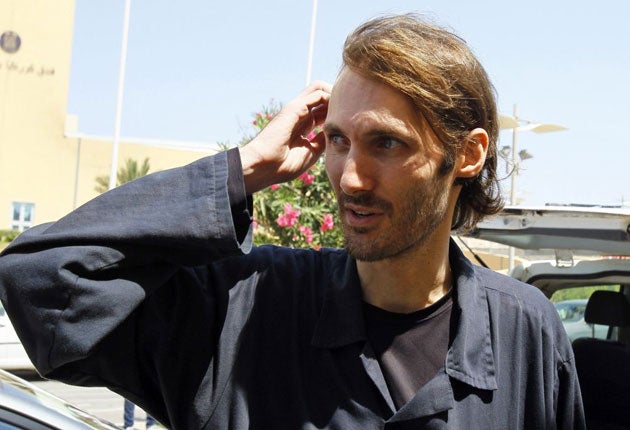'Solitary confinement was the worst thing. I thought I'd never get out'
A free man after spending five months in Gaddafi's notorious Abu Salim prison, Matthew VanDyke explains his horrific ordeal

I didn't come to Libya to do journalism. I came here for my friends. I was filming my friends so that one day they could show their children how they overthrew Muammar Gaddafi. I was documenting the history as we were going along. Some of them are like brothers to me. I don't have friends like them in the states.
Back in March, three of the guys were going to go to Brega. I wasn't really that keen on going because Ras Lanuf had just fallen. But I decided it was smart to go before fighting to get a feel for the town, to familiarise myself before it was dangerous. We spent the night at a house. There wasn't power, there wasn't a phone service and there were lots of rebels. We were aware that it was near the front but in the city the next day smiling children and townspeople were in the street.
There wasn't a sense of any danger. I thought we were behind the army because the army in Benghazi had left a few days before. Somehow we'd gotten out ahead of them. My memory of the ambush was two white pick-up trucks that had some cinderblocks in the road, that's the one key image I have.
I think I was in Sirte when I woke up. I told them: "I've been treated well, when I get back to America I'll tell people that. They said, "you'll never see America again". And I believed it.
You're photographing a guy smiling with a tray of coffee and then you wake up and you're in a cell and there's a guy who sounds like he's being tortured. It's horrible.
They put me on a plane. It was a commercial airline and I was blindfolded. The flight attendant told me we were going to America. But I could look under my blindfold and see the lights of Tripoli as we came in.
I was bound behind my back attached to my feet. It was so tight. For one or two months I had numbness, I thought it would be permanent. I thought I'd be in there for 20 or 30 years. I thought I'd never see my girlfriend again, I thought I'd never see my mother again, I thought I'd come out at the age where other people are retiring.
I thought Gaddafi had stopped at Brega and that I'd be there forever or that people might now know I'm alive. I used to look up through the skylight at the first prison and try to position myself under it when I slept so that a satellite would see me. But they didn't.
I started preparing suicide gear. I hid a plastic bag, and my yarn from my blanket, I tried to make it strong enough so it could double as a noose and I thought about hiding painkillers, faking headaches, but I didn't do that. I couldn't commit suicide because I knew that my mother drove me to the airport for me to come to Libya and I didn't want anyone to blame themselves.
The guards treated me well, the treatment got better the longer I was there. If they walked in here right now I'd go have coffee with them and we'd laugh about this whole thing.
It was the solitary confinement, the psychological torment that was unbearable. I wanted to ask for a Bible but I thought that Gaddafi had said I was al-Qa'ida so if I started asking for a Bible the guards would know I was Christian and Gaddafi's going to kill the guards because they would know the truth. I even worried that the US government would send a Seal team to bust me out and that they would kill the guards.
I though I would never get out. I still kept hearing propaganda, what I thought was propaganda, if it was even real. My Masters degree is in security studies and I'd always wanted to work for the CIA and the FBI. I had offers of employment for government agencies and I could never pass the polygraph tests because of my anxiety.
When I was released, I called my girlfriend. I think I spoke for a minute. I don't remember what I said. The conversation was surprisingly normal actually, with her and my mother, but apparently they knew I was alive just on faith, from past experience.
Matthew VanDyke was speaking to Portia Walker
Subscribe to Independent Premium to bookmark this article
Want to bookmark your favourite articles and stories to read or reference later? Start your Independent Premium subscription today.

Join our commenting forum
Join thought-provoking conversations, follow other Independent readers and see their replies